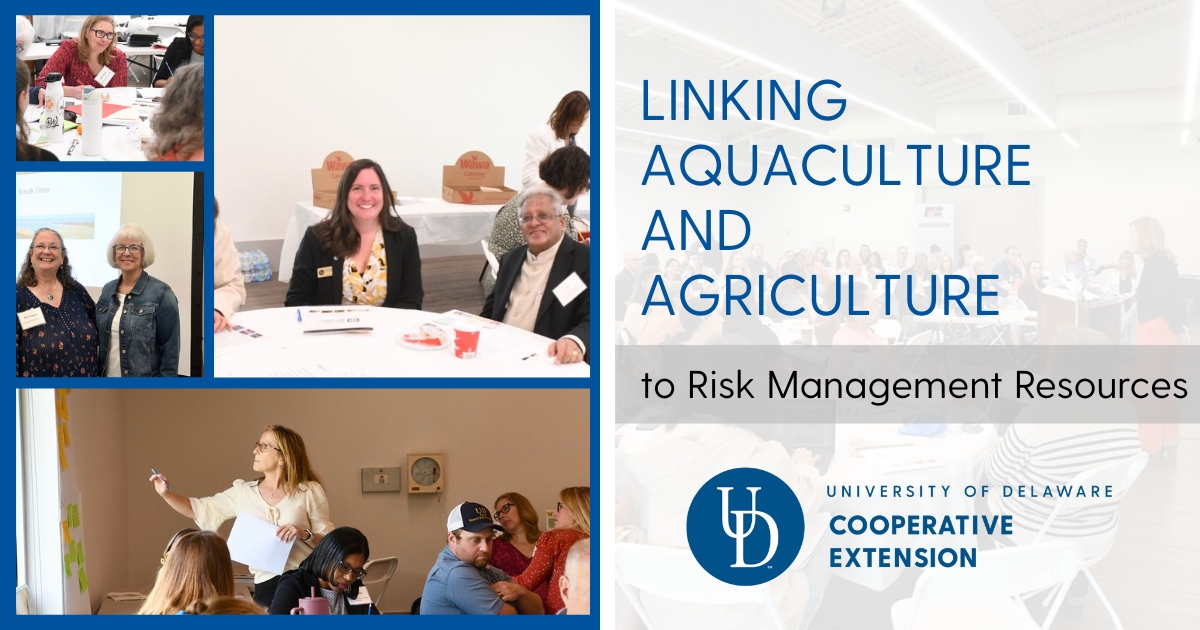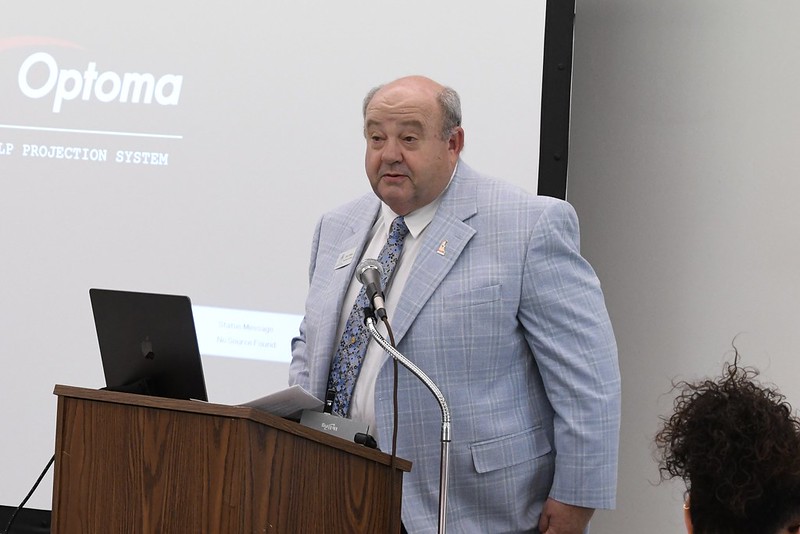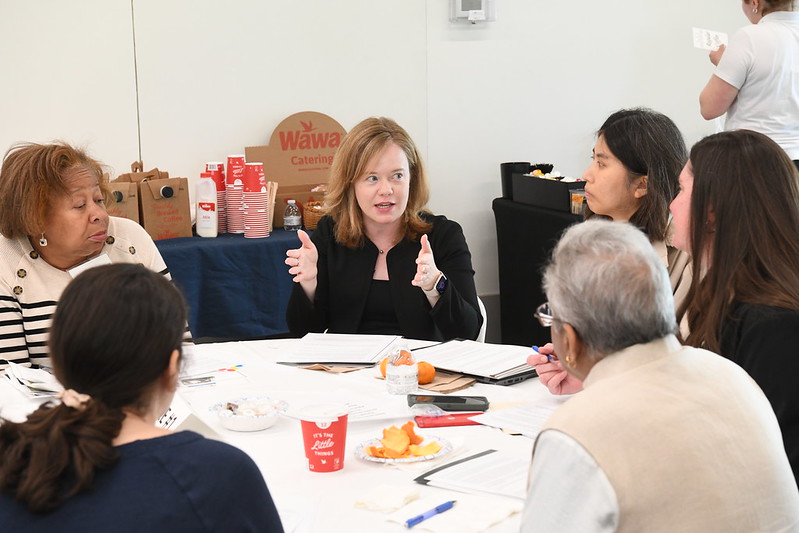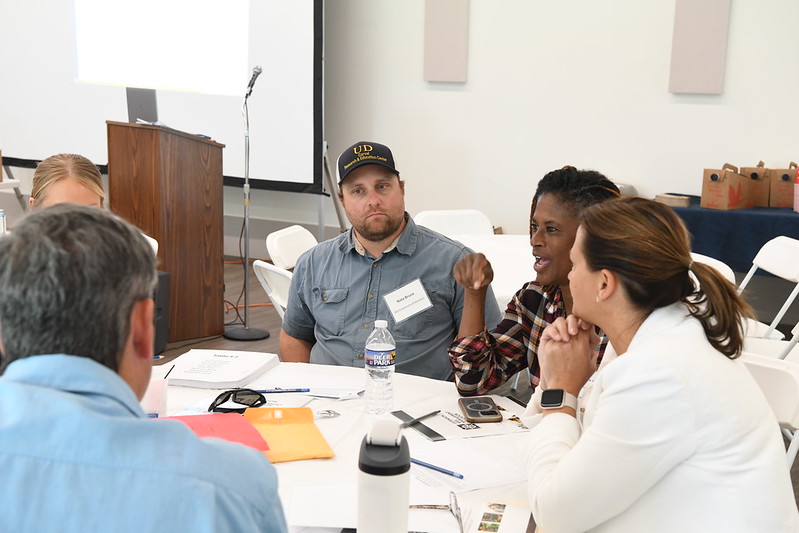
Category: Cooperative Extension

Message to Farmers: You are not alone
June 06, 2025 Article and photos by Michele Walfred
Linking Aquaculture and Agriculture to Risk Management Resources
In 1977, on his family farm in Sussex County, Don Clifton, 19, discovered his younger brother David, 16, had suffered a fatal agricultural accident with a silage wagon. Clifton faced the unimaginable task of delivering that news to his father. Clifton now serves as Delaware’s Secretary of Agriculture and recalled that life-changing moment before a large audience attending Delaware’s first Aquaculture and Agriculture Health and Vitality Forum.

“That experience lingered with me for many, many years, even to the present day. We didn’t have folks like you to turn to,” Clifton shared.
Clifton refers to Delawareans who are invested directly in or who have the capacity to support individuals involved in aquaculture and agriculture.
Organized by the University of Delaware Cooperative Extension, the “Linking Aquaculture and Agriculture Vitality and Health Forum” was developed by Laurie Wolinkski, UD Extension Risk Management, and Maria Pippids, a recently retired UD Cooperative Extension agent. The duo has worked on many farm resiliency and financial health topics and saw an opportunity to collaborate with other organizations doing similar work in the community.
The forum was conducted to help invitees learn about and address barriers to knowledge and care in physical and psychological wellness and health for farm audiences; to create and strengthen networks of care; encourage networking to learn about existing resources and leverage those resources to improve outreach to farm audiences and find opportunities within existing structures for short term impactful outcomes.
Delaware’s land and sea farming and fishing communities and representatives from health, mental health, financial, legal, and community organizations were invited to share ideas and resources, focusing on stress and mental health and creating support communities.
They gathered earlier this week at the Delaware Agriculture Museum in Dover with more than 80 attendees.
Ask anyone who raises food on land and sea about their profession; you will hear the words vocation and passion, and feel the reverence for a treasured lifestyle with traditions woven through generations. A common hope is to leave enough behind for the next generation.
Combined, agriculture and aquaculture are Delaware’s largest industry, contributing not only $12.7 billion of economic activity to the state each year, but also supporting 138,403 direct and indirect jobs in Delaware. The genesis of success often starts on a family farm or with a small business.
Delaware’s success in this sector, however, is seldom under the control of the farmer, grower or fishery operator. Unpredictability is a common reality that does not lend itself to tranquility. Without warning, stress can descend. Extreme weather events, volatile market prices, crop and health insurance premiums, global and local policy changes, labor issues, tariffs, regulations and paperwork, and on-the-job accidents and fatalities take their toll, sometimes outpacing the success level.
Clifton and his family grieved in private and tried to return to normal. “Several days later, we were both back on the job,” Clifton recalled. “I don’t know how we did it, to be honest. I really don't.” Ten years after the accident, as the cannery business faced financial difficulties, Clifton watched as his father grew indecisive. “My father couldn’t cope with difficulties in the financial situation, and he basically shut down,” Cilfton lamented. “And he was the most cheerful person you’d ever want to know; every day was good morning! Chipper as they come, but it was partly a mask, really.”
“He couldn’t accept ideas of a way out, and even though we had financial advisors. He couldn’t accept that his hard work and my hard work alone were not the answer,” Clifton continued. He often said, ‘We just got to work through it.’ That was the route he was familiar with. That was probably the mentality in those years.”
Many farmers do give up. According to the National Rural Health Association, farmers are three and a half times more likely to die by suicide than the general population.
“I have to say I certainly could have used some services that I didn’t know about, or didn’t know were available, or I didn’t see for whatever reason,” Clifton said.
He credits his wife Ruth for being his rock during difficult times.
At this week’s forum, a central point was that difficult times should not be borne only by families. Farmers are not alone. Devoted individuals and organizations have concrete ideas and can point aquaculture and agriculture practitioners in the right direction.
“I want to commend you again for opening this event, because there is a great need,” Clifton said. “The Delaware Department of Agriculture is committed to helping you to get to those who have a need.”
After hearing from several guest speakers, attendees read case study scenarios about individuals who suffered some type of loss: loss of family, loss of crop or business or loss of good health and health care coverage. Each table brainstormed ideas and solutions that could support the issue at hand.

Part of their group table work examined six case scenarios that could surface suddenly and cause mental and financial stress, disrupt a hopeful outlook and result in mental health issues.
“All the people who came today, from all walks of life, different areas of expertise, came away excited, wanting to support our farmers,” said Jennifer Volk, UD associate director of Cooperative Extension. “They identified actionable ideas that can make a dent in this issue, keep moving forward and give them the resources that they need.”
Volk felt Secretary Clifton’s remarks were poignant. “I was so moved that he was so open and that he shared with us his personal stories,” Volk said. “Sometimes that is what it takes, to hear someone who says, ‘It happened to me and my family, and I would take these resources.’ That makes it okay for others to decide.”

One person taking full advantage of the networking and resources is Andrea Haritos. A recent graduate of UD’s Annie’s Project, a six-week risk management program, Haritos operates Huck & Buck Farm in Smyrna, Delaware. Five years into turning a hobby into a business model, raising meat, seasonal vegetables, flowers and agritourism, Haritos appreciated what she heard.
“The biggest takeaway is the need to understand mental health behind farmers and what we don’t necessarily know we need to address,” Haritos said. “This gave a great spotlight to small and large farms that there are resources available to them, to be able to actually get the assistance that they need, and that there are so many different levels of mental health and mental illness.”
“The planning committee, Laurie and I were thrilled by the attendance and were encouraged to meet all of the individuals representing farmers and local agencies,” Pippidis said. “ We all learned a great deal from each other, and we're developing a powerful network to support the future of our farms and fisheries. There will be many positive outcomes from this forum.”
The forum was sponsored by the Northeast Extension Risk Management Education, United States Department of Agriculture (USDA), Delaware Department of Agriculture, Delaware Farm Bureau, Delaware Cooperative Extension through the University of Delaware and Delaware State University, and the USDA Farm Service Agency. Delaware Sea Grant and the Delaware Aquaculture Association, East Coast Delaware Shellfish Growers and the Delaware Agriculture Museum. Photos are available on the UD Cooperative Extension Flickr account.
